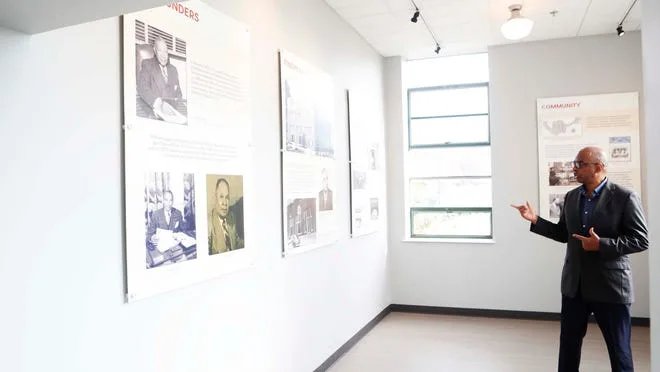As Self + Tucker Architects co-founder Jimmie Tucker paces through the museum on the ground floor of the Universal Life Insurance Building in Downtown Memphis, there’s a sternness in his voice.
He wants to ensure the weight of the historical factoids on the wall of the museum are understood.
Pointing to a portrait of the late Patricia Walker Shaw, he makes a point to comment on how rare it was for a woman to be CEO during the ’80s, let alone a Black woman for a national insurance company.
It’s a smaller pair of details that sometimes are forgotten: Patricia Walker Shaw was a trailblazer and Memphis-based Universal Life Insurance Company employed more than 700 persons across 11 states.
It’s those details that can be catalytic. It is those details that need remembering — that require admiration.
“You can’t be what you can’t see,” Tucker said.

It’s a statement for youth and a reason why Tucker wanted to have a museum about the history of the Universal Life Insurance Company inside the historic namesake building and part of a broader goal to preserve history — and pieces of Black excellence. These details, these persons, these buildings — they need to be preserved, not forgotten.
“For me, it’s not just preserving a building or site,” Self + Tucker co-founder Juan Self said. “It’s about preserving culture.”
In the early ’90s, Self and Tucker crossed paths in New York during an event for Nashville-based architectural firm McKissack & McKissack. McKissack & McKissack is the oldest African American architectural firm in the country and was the designer behind the Universal Life Insurance Building, which opened in 1949.
Self said a mutual acquittance introduced them and Tucker expressed interest in moving back to Memphis. The two remained in touch over the next several years, Self said, and eventually positioned themselves to found their own firm, Self + Tucker Architects. The Memphis-based firm opened in 1995.
The firm relocated its offices to the Universal Life Insurance Building, located at 480 Dr. Martin Luther King Jr. Ave., in 2018.
Redevelopment of the Universal Life Insurance Building
The building symbolizes something unique for both Self and Tucker. It represents the first time the firm worked as a developer. And it operated as a new standard for the firm, in terms of adaptive reuse and historical preservation.
“We wanted to save the building,” Tucker said.

The firm purchased the building in 2006 for $500,000, according to the Shelby County Register of Deeds. The building had been vacant since Universal Life Insurance Company closed in 2001.
Tucker said the redevelopment of the Universal Life Insurance Building cost around $7 million. The Egyptian Revival-style building was a civic hub for the Black community, with Universal Life Insurance providing loans and resources for Black residents.
Self + Tucker received a 10-year payment-in-lieu-of-taxes in 2015 from the Center City Revenue Finance Corp., an affiliate board of the Downtown Memphis Commission to help finance the project.
Today, the 33,000-square-foot property still operates as a civic resource for residents. The City of Memphis operates a satellite office for its Business Development Center on the basement level of the building with four other tenants. The second floor is undergoing a renovation to provide additional co-working space, Tucker said.
Projects such as the Universal Life Insurance Building have become stalwarts for the firm, Tucker said. Those projects that focus on community and provide resources or reestablish communal investment are ones they are drawn too, he said.

“The longer we’re here (in the Universal Life Insurance building) the more stories I hear about how this company touched people’s lives,” Self said.
He recalled being stopped by an elder gentleman who was inside visiting the building. Self said the man was in his late 80s and told him how he worked at the building in the ’60s and how the time with the company helped shape his life.
INSIDE LOOK:How Clayborn Temple’s renovation is helping to ‘keep the history alive’
Work at the National Civil Rights Museum
While development and preservation are important, it is such indirect congruence that has stuck with Self since he began his career. He recalls the visceral experience working at the National Civil Rights Museum had on him during his time with McKissack & McKissack. He describes feeling the power a singular place — a singular room — could have and it has remained with him since.
“That is when I could understand the impact we can have,” he said.

Self + Tucker is leading the design team for the museum’s ongoing renovation and expansion of the museum’s Legacy Building and the adjacent Founder’s Park. On Nov. 16, the firm filed a commercial alteration permit with the Memphis and Shelby County Division of Planning and Development for the Legacy Building expansion.
The $16.7 million project includes renovations on the 17,000-square-foot, three-story Legacy Building along with a 7,500-square-foot expansion, according to the permit application. The renovation is expected to be complete in 2025.
Buildings are more than just historical markers
Today, the firm is continuing its preservation work throughout the Mid-South. Self is consulting on the renovation of the historic Riverside Hotel in Clarksdale, Mississippi. The hotel, which opened in 1944, is famous for its cultural impact on Delta Blues. The hotel was originally designed as the G.T. Thomas Afro-American Hospital, however, after its conversion into a hotel it became synonymous with blues music and as a refuge. It was the only Black hotel listed in the Green Book. Victor Hugo Green created the Green Book in the 1930s. The travel guide helped provide resources for safe transit during the Jim Crow-era South for many African Americans.
The firm’s reputation has been reaching beyond the Mid-South region as well. Self said the firm has been in contact with Jonnet Solomon in Pittsburgh. Solomon purchased the 129-year-old Victorian building, which was the former site of the National Opera House, at 7101 Apple St. in Pittsburgh’s Homewood neighborhood. The site is home to the historic marker for the National Negro Opera Company and the Victorian building was where the company rehearsed and is also the former safe house for Black artists and athletes during the 1930s including Duke Ellington and heavyweight boxing champion Joe Lewis. Millions have already been raised to help restore the historic landmark and Self said Self + Tucker has been involved in some consulting and placed a bid on the project.
Self describes buildings such as the Universal Life Insurance Building and Riverside Hotel as touchstones. They represent more than just historical markers and, when redeveloped, can continue contributing to and building upon that legacy.
Tucker echoed that sentiment and highlighted the firm’s work with the historic Melrose High School and its ongoing 15-acre North Memphis Grocery Store and Resource Center development. The latter is a 15-acre redevelopment of a vacant lot located in Uptown along Chelsea Avenue, University Street and Tunica Street. The $15 million to $20 million project will add a grocery store, social service facility and affordable housing. Tucker said keeping North Memphis Grocery Store in the project’s name was intentional to help shed light on food deserts.
DOWNTOWN MEMPHIS:Eight-story mixed-use development in works near FedExForum. Here’s a look at the plans.
While the name can provide an additional educational anchor, Tucker highlighted a key component to both the Melrose High and North Memphis Grocery Store projects is sustainability.
He said providing resources and working with the community to provide additional amenities within these vacant buildings or properties is what leads to sustainability. That mixed-use helps ensure a facility remains in operation and is providing a benefit for residents and the community.
“You want the community to have a connection to that project,” Tucker said.
Neil Strebig is a journalist with The Commercial Appeal. He can be reached at neil.strebig@commercialappeal.com, 901-426-0679 or via X/Twitter,@neilStrebig
Notable projects Self + Tucker has contributed to around Memphis
Melrose Library & Genealogy Center | The historic Melrose High School site is expected to reopen in 2024
Clayborn Temple | The historic site recently completed the exterior renovation and Phase 2 of construction. Phase 3, interior renovation, will begin in 2024.
Memphis Innovation Corridor | In partnership with MATA, Self + Tucker, designed all 31 mConnect Bus Rapid Transit (BRT) stations
T.O. Fuller Interactive Center
Memphis Visitors Center
Big River Crossing | National Organization of Minority Architects 2017 Award for Overall Design Excellence
Stax Museum & Stax Music Academy | The museum celebrated its 20th anniversary in May
FedExForum
Universal Life Insurance Building | Leeds Certified building
National Civil Rights Museum & Legacy Building expansion
Harriet Performing Arts Center | The former fire station at 2788 Lamar Ave. was converted into the performing arts center including a 150-seat performance theater.



